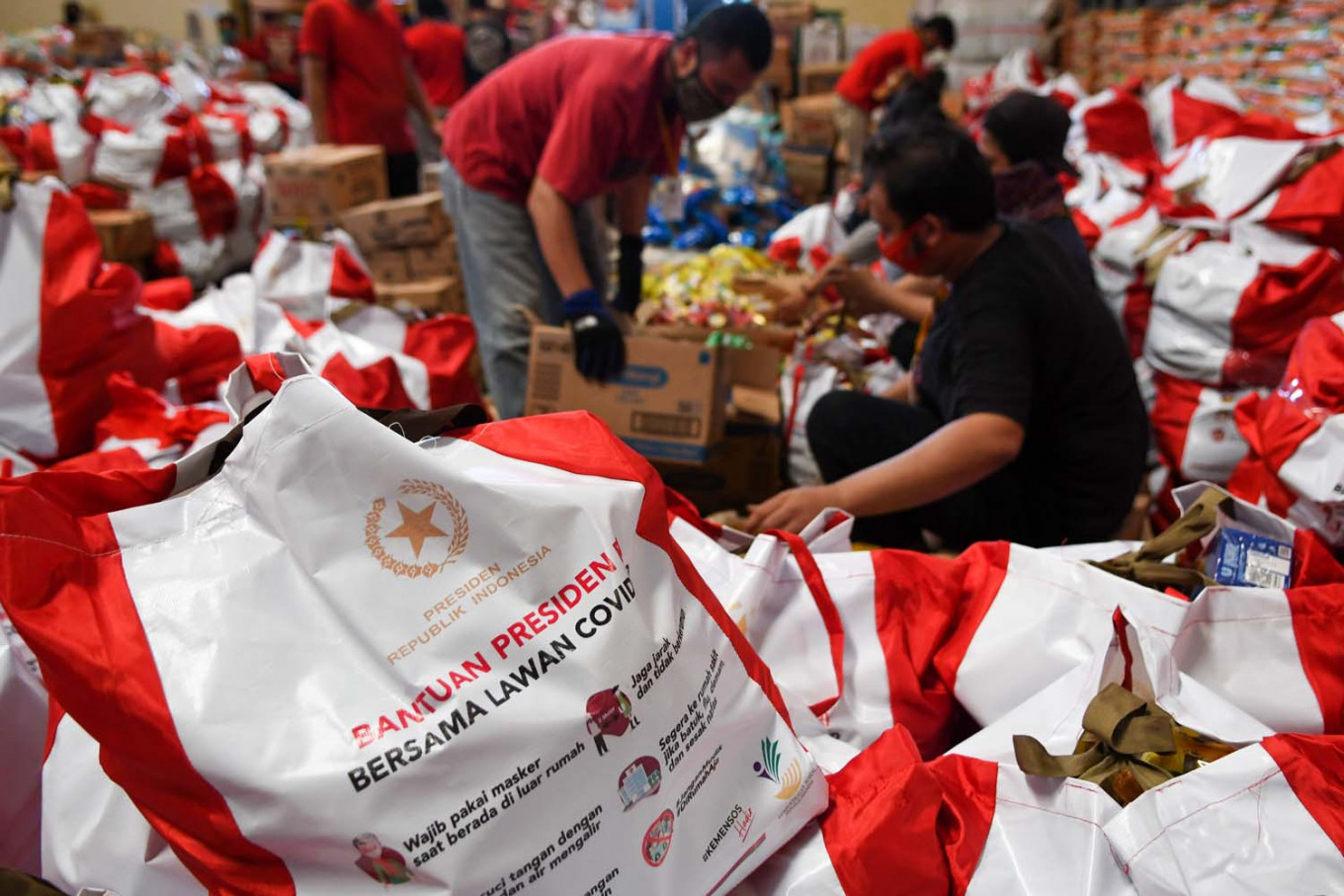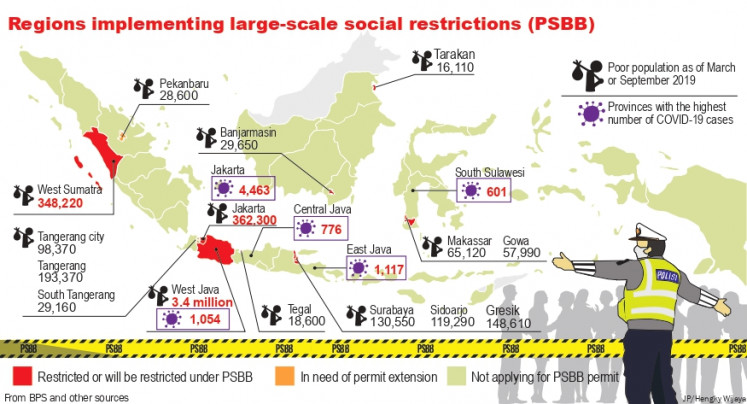Popular Reads
Top Results
Can't find what you're looking for?
View all search resultsPopular Reads
Top Results
Can't find what you're looking for?
View all search resultsCOVID-19 aid stalled, used for political stunts
Change text size
Gift Premium Articles
to Anyone
 Workers from Jakarta-owned food security company PT Food Station Tjipinang Jaya are seen packing staple food into red-and-white cloth bags with a printed message that reads: “Aid from the President of the Republic of Indonesia, Together We Fight COVID-19” at the firm's warehouse in East Jakarta on April 22.
(Antara/M Risyal Hidayat)
Workers from Jakarta-owned food security company PT Food Station Tjipinang Jaya are seen packing staple food into red-and-white cloth bags with a printed message that reads: “Aid from the President of the Republic of Indonesia, Together We Fight COVID-19” at the firm's warehouse in East Jakarta on April 22.
(Antara/M Risyal Hidayat)
W
hile millions of people out of work are depending on the arrival of social assistance to weather the COVID-19 crisis, bureaucrats have dragged their feet in the distribution process and have even taken the opportunity to boost their popularity among voters.
The distribution of food packages and cash assistance is lagging outside of Jakarta as many regencies and cities continue to gather data about their poor populations, a problem that economists warned about.
In Central Java, Klaten Regent Sri Mulyani faced criticism for putting her image on bottles of hand sanitizer in aid packages sponsored by the Social Affairs Ministry. She is seeking a second term in office in the regional elections scheduled to take place in December.
Sri denied that it was her choice to put stickers of her likeness on the bottles of hand sanitizer, saying that the aid packages were distributed with those of other institutions, including the regency administration and the Indonesian Democratic Party of Struggle (PDI-P).
“The aid from the social ministry was limited. More packages came from us. I personally also gave out hand sanitizer,” said the PDI-P politician. Sri said the stickers might have been placed on the bottles by people who wanted to tarnish her image.
Read also: 'Omnipresent' Klaten Regent Sri Mulyani draws mockery About 24.8 million Indonesians, 9.22 percent of the population, are considered poor, living on under US$1 a day, Statistics Indonesia data shows. According to a World Bank report titled Aspiring Indonesia, more than 60 million Indonesians are at risk of falling into poverty.
The central government has gradually implemented physical distancing across the country under large-scale social restrictions (PSBB) over the past month. It is also carrying out social assistance programs to help underprivileged communities endure the social and economic difficulties of the restrictions.
The government has set aside Rp 110 trillion ($7.49 billion) for social safety net programs, including for the expansion of existing programs like the Family Hope Program (PKH) under the Social Affairs Ministry’s Integrated Data on Social Welfare (DTKS) and other forms of social aid and cash transfers for those who are not in the database.
Problems have emerged in tracking down those who are not on the list. Some poor families have complained about not receiving packages while nearby well-off neighborhoods reportedly had.
In Batam, Riau Islands, Mayor Muhammad Rudi said many residents had not received the aid. He told them to report to their subdistrict and district heads and promised them that help would arrive soon.
“We will provide more packages. For instance, today [Sunday] I received 1,000 food packages. I will give them to those who have not received them,” he said, adding that he would prioritize the poor.
The NasDem Party politician said the city administration did not have enough money to enforce social restrictions on the island, which is located next to Singapore.
Regions implementing large-scale social restrictions (PSBB) (JP/Hengky Wijaya) In East Java, in addition to the social aid that is set to be distributed to 5.91 million families, the local administration will give Rp 100,000 to each family for three months. However, Governor Khofifah Indar Parawansa said municipalities and regencies in the province had not yet submitted the names of recipients.
In Jakarta, the country’s COVID-19 epicenter, there were reports that several companies that the government had appointed to help pack staple foods for distribution to affected families had experienced delays caused by a shortage of special bags printed with a message from President Joko “Jokowi” Widodo.
Jakarta-owned food security company PT Food Station Tjipinang Jaya has been packing staple foods into red-and-white cloth bags with the printed message: “Aid from the President of the Republic of Indonesia, Together We Fight COVID-19.”
One of the firm’s workers, who spoke on the condition of anonymity, said his company had received an order to pack 20,000 bags per day in mid-April but that it had not been meeting the daily target because of insufficient packaging.
Read also: Staple food distribution hampered as bags with President's message run short Governor Anies Baswedan said that about 1.6 percent of the packages meant for 1.2 million beneficiaries had been misallocated in the first phase of distribution, which ended on April 25.
“They did not reach the beneficiaries because of a wrong address or a case where the recipient had died,” Anies said on Friday.
The distribution of aid is currently on hold and will resume 10 days before Idul Fitri. Anies said the administration was updating its data to include more beneficiaries.
SMERU researcher Luhur Bima said the government had shown some improvements in updating the list of beneficiaries from 2005, when the first cash transfer program was rolled out. However, a lack of human resources has made it challenging for the administration to achieve 100 percent accuracy on poverty data.
“The data updating process is still not optimal. This causes confusion over who is eligible for the aid programs,” he told The Jakarta Post on Sunday.
Donal Fariz of Indonesia Corruption Watch (ICW) criticized the politicians who used the aid distribution for political gain, saying that it was tantamount to corruption.
“But even the Corruption Law cannot charge such attempts as a form of corruption, [unless] they occurred during the election,” he said.
ICW coordinator Adnan Topan Husodo pointed out that the mass distribution of aid during the pandemic could trigger many illicit practices, from illegal levies to price gouging.
“During an emergency situation like this, unfortunately, supervision is lacking,” Adnan said.










